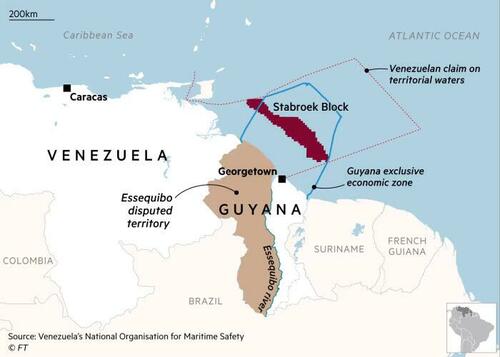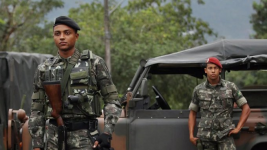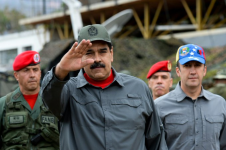ZeroHedge - On a long enough timeline, the survival rate for everyone drops to zero

www.zerohedge.com
Latin America On Edge As Venezuela's Maduro Holds Referendum Whether To Invade Oil-Rich Neighbor Guyana
BY TYLER DURDEN
FRIDAY, DEC 01, 2023 - 02:58 PM
In a move that has prompted many to wonder which is the bigger banana republic, Venezuela or the US, Joe Biden's new BFF, Venezuelan dictator Nicolas Maduro (
who has promised to export a few barrels of oil to the US president - now that draining the SPR is no longer an option - to keep gas prices low ahead of the 2024 presidential election in exchange for sanction relaxation and defacto recognition by the White House that Maduro is the dictatorially "democratically" elected president of Venezuela, making a mockery of a decade of Western virtue-signaling sanctions), on Sunday
Caracas is set to hold a referendum among Venezuelans on annexing (i.e., invading and taking over) a whopping 160,000 sq km of extremely oil-rich land in neighbouring Guyana.

Why now? Why
only now when Caracas has for more than 200 years claimed rights over Essequibo, a vast swath of the territory Guyana? Simple: because as we said several days ago,
it was only a few months ago that Maduro realized he has leverage over the US president of the "most powerful nation in the world" and get away with anything... even invading a sovereign nation.
View: https://twitter.com/zerohedge/status/1730048134305181744?ref_src=twsrc%5Etfw%7Ctwcamp%5Etweetembed%7Ctwterm%5E1730048134305181744%7Ctwgr%5Ee82be050ea428c4edc5153617d216506637aff1d%7Ctwcon%5Es1_&ref_url=https%3A%2F%2Fwww.zerohedge.com%2Fmarkets%2Flatin-america-edge-venezuelas-maduro-holds-referendum-whether-invade-oil-rich-neighbor
Of course, (oil rich but extraction poor) Venezuela's heightened interest at this expanse of Amazon jungle springs in part from its resource riches, including offshore oil deposits that have since 2019 made Guyana the world’s fastest-growing economy. Another reason lies closer to home for Venezuela’s strongman leader Nicolás Maduro: elections next year. But at the end of the day, had Biden not signed a smoky back-room deal with Maduro, admitting he needs the dictator's oil in exchange for what appears to be a diplomatic blank check, none of this would have happened. Instead, we are now facing actual war between two nations which between them have some of the largest oil deposits in the world.
As the
FT notes, the potential for Venezuela, an ally of Russia, to follow the referendum with an incursion into western-leaning Guyana has raised concerns in the region. Brazil this week said it had increased the military presence in its northern areas, which border both countries.
“On Sunday December 3, we will respond to the provocations of Exxon, the US Southern Command, and the president of Guyana with a people’s vote,” Maduro said during a broadcast of his weekly television program on November 20.
Guyana correctly fears that the referendum is be a pretext for a land grab, and has appealed to the International Court of Justice (ICJ) to halt the referendum — a move that Caracas has rejected, though its claim to the land is largely internationally unrecognised.
It isn't: on Friday,
judges at the World Court on Friday
ordered Venezuela to refrain from taking any action that would alter the situation on the ground. The court did not expressly forbid Venezuela to hold a planned Dec. 3 referendum over its rights to the region around the Esequibo river, the subject of the long-running border dispute, as Guyana has requested. However, judges at the International Court of Justice - as the World Court is formally known - made clear that any concrete action to alter the status quo should be stopped.
"The court observes that the situation that currently prevails in the territory in dispute is that Guyana administers and exercises control over that area," presiding judge Joan Donoghue said. "Venezuela must refrain from taking any action which would modify that situation," she added
“This is a textbook example of annexation,” Paul Reichler, a US lawyer representing Guyana before the ICJ, said in The Hague last month, claiming that Venezuela was preparing a military build-up in the Essequibo region in case it wished to enforce the outcome of the referendum.
For its part, Caracas said that its troops were carrying out anti-illegal mining operations near the territory, a sparsely populated region that is home to about 200,000 Guyanese who speak English and indigenous languages, though little Spanish.
Meanwhile in pro-Maduro Brazil, local media reported that a senator for the state of Roraima said the defense minister had agreed to his requests for military reinforcements in the municipality of Pacaraima, a strategic location for access to Essequibo. The defence ministry said: “Defence actions have been intensified in the northern border region of the country, promoting a greater military presence.” It wasn't immediately clear if Brazil's socialist leader Lula is planning on aiding his comrade Maduro in invading and pillaging Guyana's oil, but it would be par for the socialist course, especially when the US president is implicitly approving your actions.
That said, analysts question whether Venezuela will genuinely seek to annex the territory. They argue the referendum exercise is aimed at bolstering Maduro’s domestic support ahead of elections that Venezuela agreed to hold in exchange for relief from debilitating sanctions imposed by the US.
“Political calculations are driving Maduro to escalate tensions in an attempt to stir up nationalist sentiment, but those same political calculations also limit his military options,” said Theodore Kahn, director for the Andean region at the consultancy Control Risks.
“An actual invasion would shut the door to further negotiations with the US and force the Biden administration to reimpose oil sector sanctions.”
Come to think of it, that's a joke of a deterrent, considering Maduro had no problem living with sanctions for years. If Maduro were to get his grubby hands on some of the most state of the art oil facilities in the world - as a reminder, Guyana is where Exxon has invested billions to extract much of the country's oil- he would do so in a heartbeat.
Still, Maduro needs to mobilise party loyalists to defend two decades of socialist rule during which his party and its predecessors have turned Caracas into an international pariah, shattered its state-run oil industry, fueled mass emigration and empowered violent gangs.
Luis Vicente León, who runs Caracas-based research company Datanálisis, said the government was using the referendum to reduce the perceived impact of a pre-election primary held by the opposition in October despite government disapproval. The primary drew 2.4mn voters to the polls, well above expectations.
“It’s also a test of the government’s capacity to engage its political machinery and mobilise voters,” León said. “
Alongside that, it pressures the opposition to take a position on a sensitive subject and gives [Maduro] a potential excuse to declare a state of emergency and avoid the election altogether.”
Maduro, in office since his firebrand predecessor Hugo Chávez died of cancer in 2013, has yet to officially announce his candidacy in the upcoming elections. However, he is widely expected to run despite approval ratings of just 20 per cent, according to Datanálisis, amid an economic and humanitarian crisis.
Hilarious, Maduro’s re-election in 2018 was regarded by the US and its allies as fraudulent, but so much has changed since then, well not that much: just Biden becoming president and folding to Maduro's demands in exchange for oil. Seeking to entice him into allowing a “free and fair” election this time (please don't laugh)
the US last month relaxed sanctions on oil, gold and secondary financial markets for six months. The move followed a deal between Maduro and a US-backed faction of the opposition to resume political talks.
Yet hopes of a political opening were tempered when just days later, the government-backed Supreme Justice Tribunal suspended the results of the opposition primary, which was convincingly won by María Corina Machado.
Machado, a pro-market former lawmaker who once called for external military intervention in Venezuela, is banned from holding office at present, something she claims will not stop her from running.
While the government and the fractious opposition agree that the Essequibo region is part of Venezuela’s territory, Machado has said the referendum is a “distraction” that must be suspended. She advocates settling the dispute at the ICJ.
The referendum will put five questions to Venezuela’s public.
One seeks approval for granting all residents of the Essequibo region Venezuelan citizenship and creating a new state within Venezuela, while another asks voters if they recognise the jurisdiction of the ICJ to rule on the matter. Both would likely lead to a military invasion.
In April, the ICJ ruled that it had jurisdiction to decide on the territorial dispute, following a request from Guyana in 2018 to confirm the border that was drawn in arbitration in 1899 between Venezuela and what was then British Guiana, a colony. A final ruling could take years, however.
“It is not an exaggeration to describe the current threat to Guyana as existential and the need for provisional measures as urgent,” Carl Greenidge, who leads Guyana’s delegation at the ICJ, told judges in The Hague with reference to the referendum.
A specialised US army delegation visited Guyana this week, and discussed “processes to enhance both countries’ military readiness and capabilities to respond to security threats,” said the US embassy in Georgetown. Bharrat Jagdeo, Guyana’s vice-president, said last week that “
all the options available for us to defend our country will be pursued. Every option.”
Caracas has long held that the Essequibo river to the region’s east is its natural border, as it was during Spanish rule before 1899. But Venezuela’s interest in pressing that claim has fluctuated. In 2004, while seeking international support for his Bolivarian revolution, Chávez said in Guyana that Georgetown had the right to grant concessions in the Essequibo territory.
But since 2015,
when ExxonMobil announced it had found oil beneath the waters off the Essequibo coast in the Stabroek Block, Caracas has adopted a more bellicose tone (well, of course).
In October this year, the US major — which leads a consortium producing oil in the South American country — made another find in the waters claimed by Venezuela. Drilling bids were awarded to companies including Exxon, French major Total, and local company Sispro. Francisco Monaldi, a Latin America energy expert at Rice University in Houston, said: “
So far Exxon’s wells and discoveries are in the area north of Guyana’s undisputed land territory, but the awarded oil blocks do go into the disputed waters.”
Oil is transforming the Guyanese economy, which grew 62 per cent last year, according to the IMF, and is projected to expand another 37 per cent this year. With around 11bn barrels in reserves and a population of just 800,000, the country has the largest amount of oil per capita in the world.
Meanwhile, Venezuela has the world’s largest proven reserves, and in its heyday at the turn of the century pumped about 3mn barrels per day, but mismanagement, corruption and sanctions led production to collapse. In September this year, it pumped 735,000 bpd.
Exxon said that “border issues are for governments and appropriate international organisations to address”.
Still, we wouldn't be surprised if Darren Woods is quietly putting together a mercenary army to quietly take out Maduro. It should cost him at most 2-3 days worth of oil extraction revenues.









